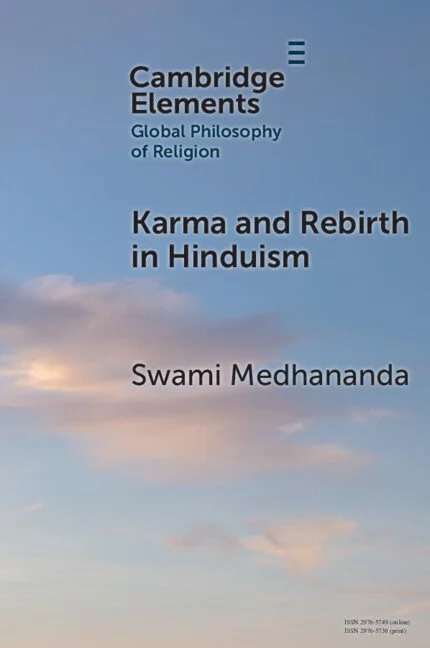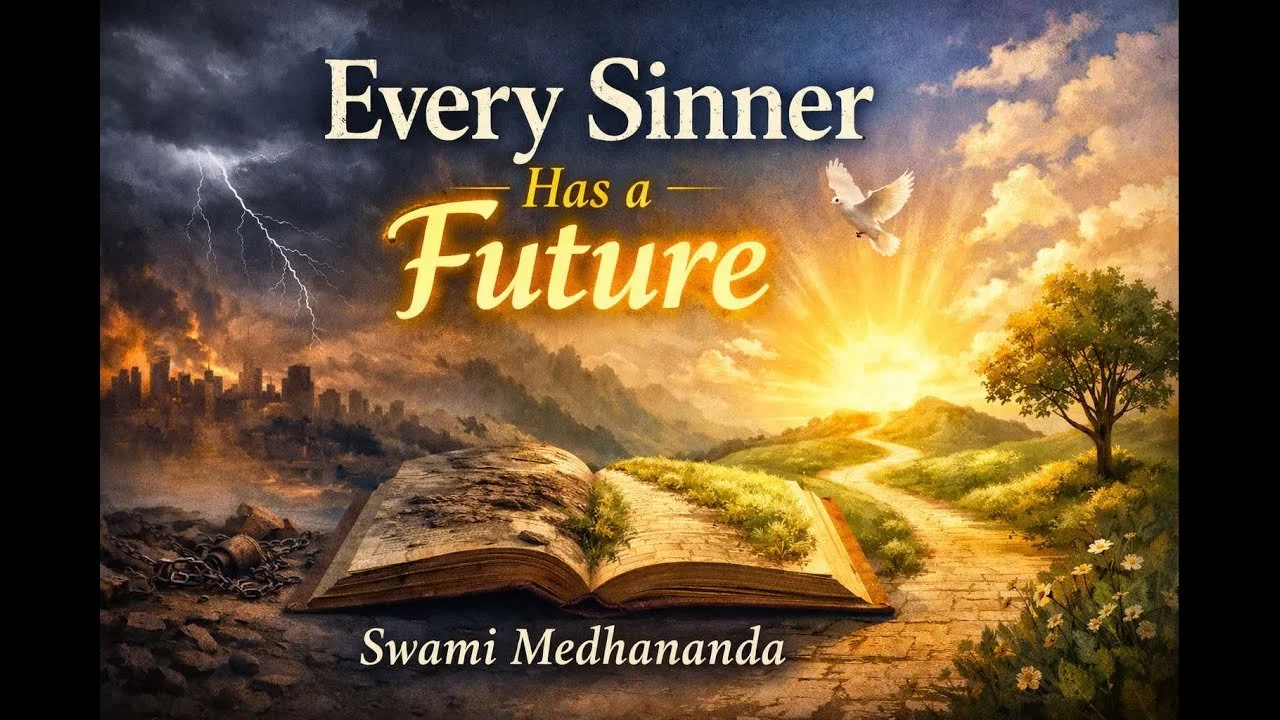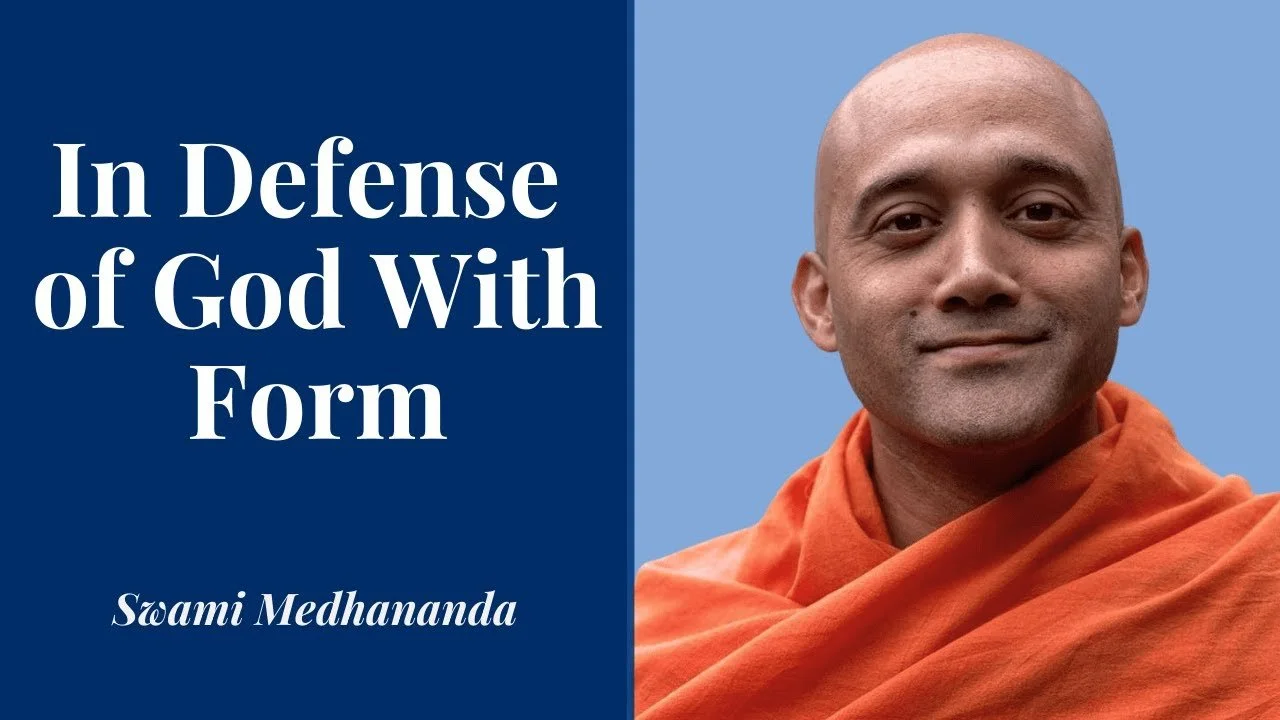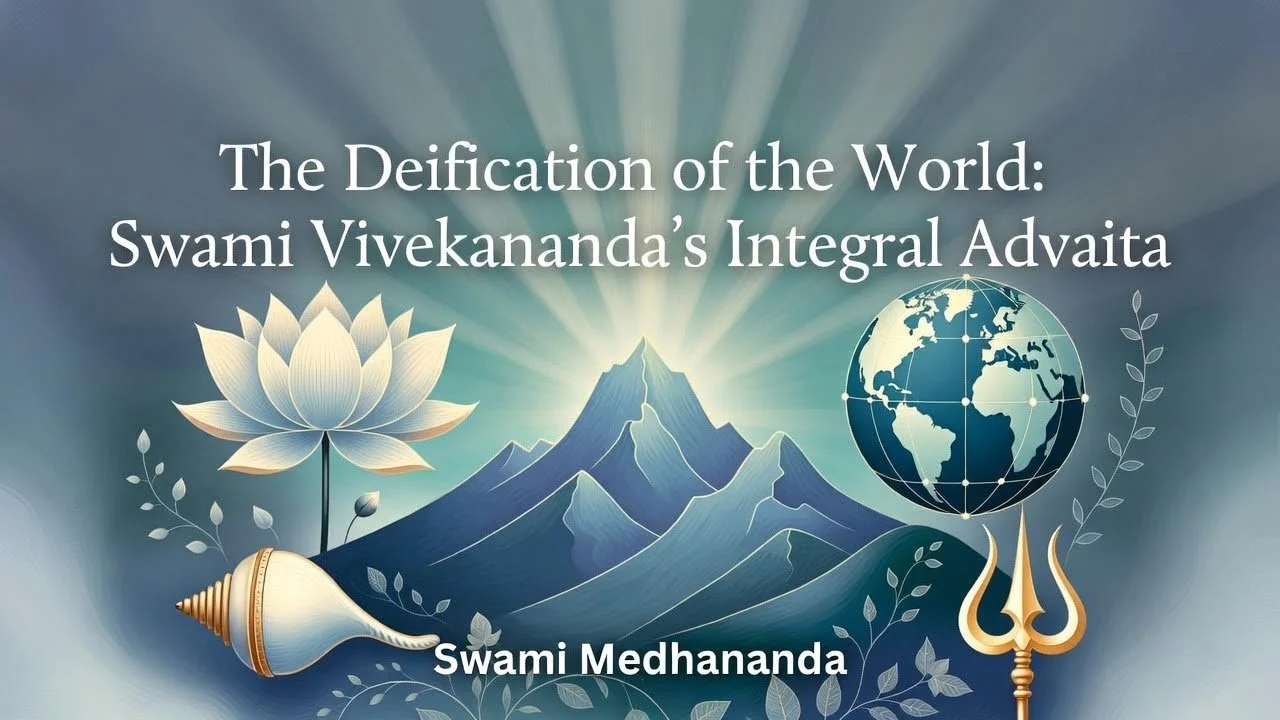
Swami Medhananda is a monk of the Ramakrishna Order and an academic philosopher, currently serving as Senior Research Fellow in Philosophy at the Vedanta Society of Southern California in Hollywood. He is also the Hindu Chaplain at UCLA and the University of Southern California.
New Book: Karma and Rebirth in Hinduism (Cambridge University Press)
Order a hard copy at a 30% discount (with the discount code KHR30) until the end of 2025 through Cambridge University Press.
This Element provides an argumentative introduction to the doctrines of karma and rebirth in Hinduism. It explains how various Hindu texts, traditions, and figures have understood the philosophical nuances of karma and rebirth. It also acquaints readers with some of the most important academic debates about these doctrines. The Element's primary argumentative aim is to defend the rationality of accepting the truth of karma and rebirth through a critical examination of an array of arguments for and against these doctrines. It concludes by highlighting the relevance of karma and rebirth to contemporary philosophical debates on a variety of issues.
Praise for the book:
“In this luminous engagement with themes relating to the rationality and the reality of karma and rebirth, Swami Medhananda skillfully leads the reader through a vast body of specialist literature…. This meticulous study reminds us that we should not speak in terms of the singular Hindu response to vexed questions such as how karma works or what gets reborn; at the same time, without getting lost in the detailed terrain it sensitively addresses the big question of whether it is rational to believe in cosmological and existential processes involving karma and rebirth. Thus, this overview is an exemplar of cross-cultural philosophy of religion where meticulous attention to Indic concepts of consciousness, language, and reality animates a critical dialogue with Western standpoints.”
— Ankur Barua, Cambridge University
Upcoming Talks, Classes and Events
-
Vedanta Society of Southern California
February 2026 Bulletin
-
Class on Bhagavad Gita in the Light of Sri Ramakrishna
Sunday, February 1, 9:30 am PST
Monday, February 16, 7:30 pm PST
VSSC Hollywood (Green House living room)
Classes are livestreamed on the VSSC YouTube channel.
Recent Books
Karma and Rebirth in Hinduism (Cambridge University Press, 2025)
This Element provides an argumentative introduction to the doctrines of karma and rebirth in Hinduism. It explains how various Hindu texts, traditions, and figures have understood the philosophical nuances of karma and rebirth. It also acquaints readers with some of the most important academic debates about these doctrines. The Element's primary argumentative aim is to defend the rationality of accepting the truth of karma and rebirth through a critical examination of an array of arguments for and against these doctrines. It concludes by highlighting the relevance of karma and rebirth to contemporary philosophical debates on a variety of issues.
Swami Vivekananda's Vedāntic Cosmopolitanism (Oxford University Press, 2022)
“Swami Medhananda’s Swami Vivekananda’s Vedāntic Cosmopolitanism is an extraordinary achievement. A brilliant, deep and searching exploration of Swami Vivekananda, this may also be the best book in English on philosophical debates in modern Hinduism, and philosophy of religion more generally.”
- Pratap Bhanu Mehta, Princeton University
Infinite Paths to Infinite Reality: Sri Ramakrishna and Cross-Cultural Philosophy of Religion (Oxford University Press, 2018)
“Ayon Maharaj’s Infinite Paths to Infinite Reality is a ground-breaking study of the Bengali mystic Sri Ramakrishna. This volume will become a central work in our understanding of Sri Ramakrishna….Maharaj deftly combines exegetical work on the Bengali source-texts with debates in cross-cultural philosophy of religion, indicating lines of conversation between Ramakrishna and various contemporary western thinkers….The arguments are erudite, and display extensive, careful, and sensitive readings of the philosophers whose views are discussed.”
– Ankur Barua, Cambridge University
Panentheism in Indian and Western Thought: Cosmopolitan Interventions (Routledge, 2023)
This book offers the first in-depth study of a wide range of Indian paradigms of panentheism, both ancient and modern, and brings these paradigms into creative and constructive dialogue with Western traditions. The volume discusses a broad range of Indian panentheistic traditions, including the Upaniṣads, Bhedābheda Vedānta, Rāmānuja’s Viśiṣṭādvaita Vedānta, Yogācāra Buddhism, and the Ramakrishna-Vivekananda tradition. The chapters connect these traditions with Western panentheistic conceptions developed by thinkers such as Spinoza, Berkeley, Schopenhauer, Krause, Royce, Tononi and Koch, and Western process philosophers. Panentheism in Indian and Western Thought will be of interest to scholars and advanced students working in philosophy of religion, Indian philosophy, comparative philosophy, and comparative religion.
Recent Articles
Can Consciousness Have Blind Spots? A Renewed Defence of Sri Aurobindo's Opaque Cosmopsychism (2024)
Journal of Consciousness Studies 31.9–10 (2024), pp. 113-131
This article defends the cosmopsychist doctrine of the Indian philosopher-mystic Sri Aurobindo, arguing that it has distinct advantages over rival panpsychist positions. After tracing the dialectical trajectory of recent philosophical debates about panpsychism up to the present, I bring Aurobindo into dialogue with Miri Albahari, who has defended a form of panpsychist idealism based on the classical Advaita Vedānta philosophy of Śaṅkara. I critique Albahari's panpsychist idealism from an Aurobindonian standpoint, arguing that its Śaṅkaran metaphysical commitments and eliminativist implications make it an unsatisfactory account of consciousness. I then summarize Aurobindo's cosmopsychism and explain its distinctive solution to the individuation problem, which is widely considered to be the most serious problem for all forms of cosmopsychism. According to Aurobindo, Divine Consciousness individuates into multiple creaturely consciousnesses through the twin processes of 'self-limitation' and 'exclusive concentration'. I conclude the paper by addressing several potential objections to Aurobindo's cosmopsychism.
“Harmonizing the Personal God with the Impersonal Brahman: Sri Ramakrishna’s Vijñāna Vedānta in Dialogue with Gauḍīya Vaiṣṇavism”
In Vaiṣṇava Concepts of God: Philosophical Perspectives, eds. Ricardo Silvestre, Alan Herbert, Benedikt Paul Göcke (London: Routledge, 2024), pp. 184–200.
The Bengali mystic Sri Ramakrishna (1836–1886) was raised in a Vaiṣṇava household and engaged in numerous Vaiṣṇava practices throughout his lifetime. In light of Ramakrishna’s strong Vaiṣṇava leanings, the question arises: what are the similarities and differences between Ramakrishna’s teachings on God and Gauḍīya Vaiṣṇava conceptions of God? Gauḍīya Vaiṣṇava theologians hold that the Supreme Reality is the personal God Kṛṣṇa whose “peripheral effulgence” is the impersonal Brahman. Although Gauḍīya Vaiṣṇava thinkers grant equal reality to the personal God and the impersonal Absolute, they nonetheless hold that the realization of Kṛṣṇa is of infinitely greater value than the Advaitic realization of the impersonal Brahman. By contrast, Ramakrishna, on the basis of his own varied spiritual experiences, maintained that the impersonal Brahman-Ātman and the personal Śakti are the static and dynamic aspects respectively of one and the same Infinite Divine Reality. Accordingly, he held that jñānīs, yogīs, and bhaktas all realize one and the same Divine Reality in different forms and aspects, none of which can be said to be superior to any of the others. Ramakrishna, this chapter argues, thereby harmonized personalist and impersonalist conceptions of the ultimate reality without hierarchically subordinating the latter to the former.
“An Integral Advaitic Theodicy of Spiritual Evolution: Karma, Rebirth, Universal Salvation, and Mystical Panentheism”
Religious Studies 59 (2023), pp. 67–81
This article outlines and defends an ‘Integral Advaitic’ theodicy that takes its bearings from the thought of three modern Indian mystics: Sri Ramakrishna, Swami Vivekananda, and Sri Aurobindo. Their Integral Advaitic theodicy has two key dimensions: a doctrine of spiritual evolution and a panentheistic metaphysics. God has created this world as an arena for our moral and spiritual evolution in which evil and suffering are as necessary as good. The doctrine of spiritual evolution presupposes karma, rebirth, and universal salvation. The doctrines of karma and rebirth shift moral responsibility for evil from God to His creatures by explaining all instances of evil and suffering as the karmic consequence of their own past deeds, either in this life or in a previous life. The doctrine of universal salvation also has important theodical implications: the various finite evils of this life are outweighed by the infinite good of salvation that awaits us all. After outlining this Integral Advaitic theodicy, I address some of the main objections to it and then argue that it has a number of comparative advantages over John Hick’s well-known ‘soul-making’ theodicy.
“The Playful Self-Involution of Divine Consciousness: Sri Aurobindo's Evolutionary Cosmopsychism and His Response to the Individuation Problem”
The Monist, 105 (2022), pp. 92–109
This article argues that the Indian philosopher-mystic Sri Aurobindo (1872–1950) espoused a sophisticated form of cosmopsychism that has great contemporary relevance. After first discussing Aurobindo’s prescient reflections on the “central problem of consciousness” and his arguments against materialist reductionism, I explain how he developed a panentheistic philosophy of “realistic Adwaita” on the basis of his own spiritual experiences and his intensive study of the Vedāntic scriptures. He derived from this realistic Advaita philosophy a highly original doctrine of evolutionary cosmopsychism, according to which the Divine Saccidānanda is “involved” in everything in the universe and gradually manifests itself at each stage of the evolutionary process from matter to life to mind, and ultimately, to Supermind—the final stage that is yet to come, upon the attainment of which we will attain knowledge of our true divine nature as Saccidānanda. I then reconstruct Aurobindo’s novel solution to the individuation problem, according to which the Divine Saccidānanda individuates into various distinct consciousnesses by playfully limiting itself through a process of “exclusive concentration.” Finally, I highlight the continued relevance of Aurobindo’s evolutionary cosmopsychism by bringing him into conversation with Itay Shani, a contemporary proponent of cosmopsychism.
“From Good to God: Swami Vivekananda’s Vedāntic Virtue Ethics”
International Journal of Hindu Studies 27.1 (April 2023): 67–96
In this article, I will argue that the modern Hindu monk Swami Vivekananda (1863–1902) developed a distinctively Vedāntic form of virtue ethics that deserves a prominent place in contemporary philosophical discussions. Sections 1 and 2 set the stage by showing how Vivekananda motivated his own ethical standpoint through a critique of rival ethical theories. Section 1 discusses his criticisms of ethical theories based on “objective duty,” which bear a resemblance to deontological theories. Section 2 outlines Vivekananda’s criticisms of utilitarian ethics, especially that of John Stuart Mill. Section 3 outlines the main features of Vivekananda’s Vedāntic virtue ethics and his arguments in support of it. Finally, section 4 compares the differing approaches to the problem of moral luck adopted by Vivekananda and by the contemporary philosopher Michael Slote. By means of this comparison, I identify some of the potential philosophical advantages of Vivekananda’s Vedāntic virtue ethics over other ethical theories.
Recent Book Review
Review of Loriliai Biernacki's The Matter of Wonder: Abhinavagupta's Panentheism and the New Materialism in Notre Dame Philosophical Reviews
Notre Dame Philosophical Reviews, 2025



















